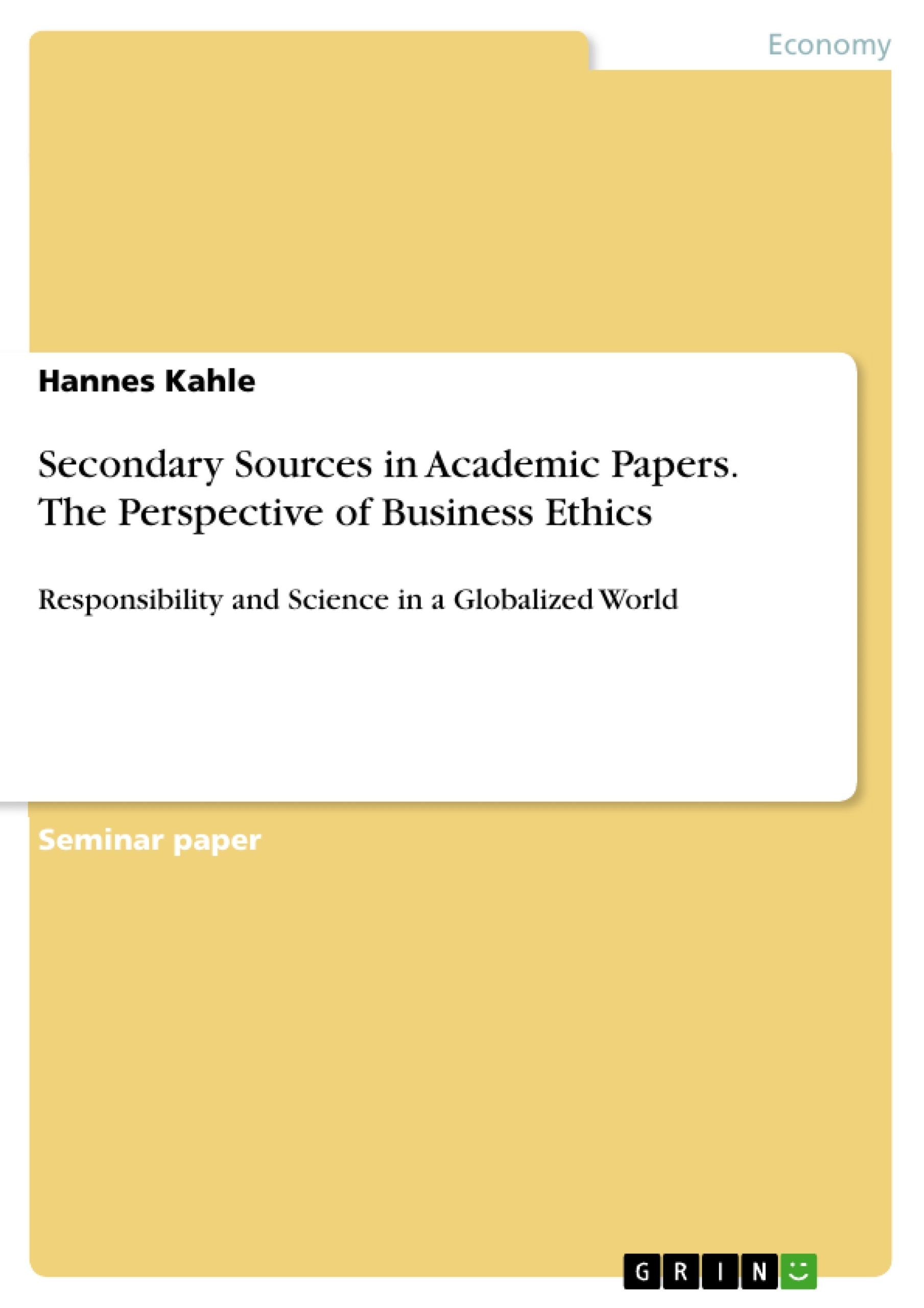The aim of this essay is to analyze to what extend quotations in academic articles and/or monographs that solely exist out of secondary and not primary sources are problematic from the perspective of academic ethics in general and business ethics in particular. Despite being an accepted tool in academic writing and research, the excessive use of secondary sources resembles the exploitation of foreign efforts in the procurement and analysis of primary sources. The research method of this essay is based on an extensive literature research to work out central aspects of academic ethics being relevant for the creation of academic articles and monographs as products of scientific communities. Furthermore, different philosophical approaches are consulted to gain a comprehensive understanding of the business ethics approach and its fundamental pillars. The analysis comes to the conclusion, that citations solely from secondary sources and in the absence of a comprehensive confrontation with primary literature harm central values introduced by the European University Institute as the cornerstones of integrity and good scientific practice. From a business ethics point of view, the conduct violates rules of proportion and endangers the beneficiance of (scientific) communities as it represents an act of selfishness to the own self-interest.
Inhaltsverzeichnis (Table of Contents)
- Abstract
- Introduction
- Quotations out of secondary sources in academic writing
- Perspectives on ethics
- General definition and implications
- Academic ethics and virtues
- Business ethics
- Conclusion
- References
Zielsetzung und Themenschwerpunkte (Objectives and Key Themes)
This Essay aims to analyze the problematic nature of quotations in academic articles and/or monographs solely from secondary sources, considering the perspectives of academic ethics and business ethics.
- The ethical implications of relying solely on secondary sources for academic research.
- The role of primary sources in ensuring the integrity and objectivity of academic work.
- The virtues of academic ethics and their application to the use of secondary sources.
- The ethical considerations in business ethics related to the utilization of secondary sources in research.
- The potential for exploitation of foreign research efforts when solely using secondary sources.
Zusammenfassung der Kapitel (Chapter Summaries)
The introduction discusses the increasing reliance on secondary sources in academic writing and highlights the ethical concerns surrounding their exclusive use. The chapter on quotations out of secondary sources explores the classification of primary, secondary, and tertiary sources and their relevance to academic work. The section on perspectives on ethics introduces a framework for analyzing the ethical implications of relying solely on secondary sources, focusing on general definitions, academic ethics, and business ethics.
Schlüsselwörter (Keywords)
The key focus topics of this essay include academic ethics, business ethics, primary sources, secondary sources, plagiarism, exploitation of research efforts, and academic integrity. It examines the ethical considerations surrounding the use of secondary sources in academic writing, exploring the implications for scientific communities and the values of good scientific practice.
Frequently Asked Questions
Why is relying on secondary sources in academic papers problematic?
Exclusive use of secondary sources can be seen as exploitation of others' efforts and may compromise the integrity and objectivity of the research.
What is the difference between primary and secondary sources?
Primary sources are original materials or data, while secondary sources analyze, interpret, or summarize those primary materials.
How does business ethics view the use of secondary sources?
From a business ethics point of view, avoiding primary literature can represent an act of selfishness and violates rules of proportion in scientific work.
What are the cornerstones of good scientific practice?
Integrity, transparency, and a comprehensive confrontation with primary literature are essential for maintaining scientific quality.
Can excessive secondary sourcing lead to plagiarism?
While not always direct plagiarism, it risks misrepresenting the source's original context and fails to provide independent verification of facts.
- Quote paper
- Hannes Kahle (Author), 2016, Secondary Sources in Academic Papers. The Perspective of Business Ethics, Munich, GRIN Verlag, https://www.grin.com/document/374702



